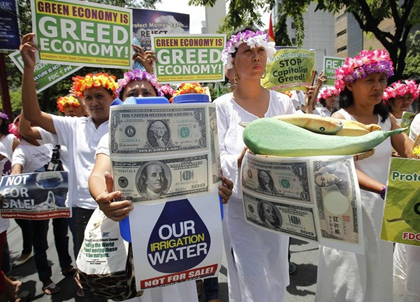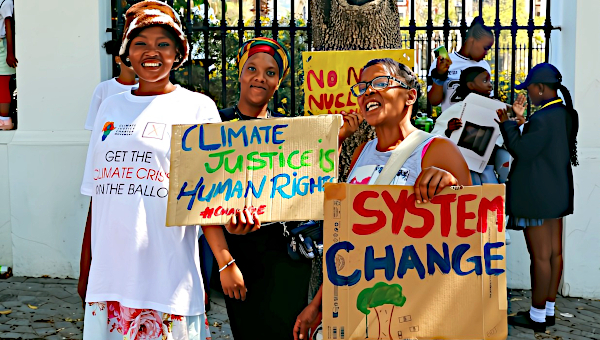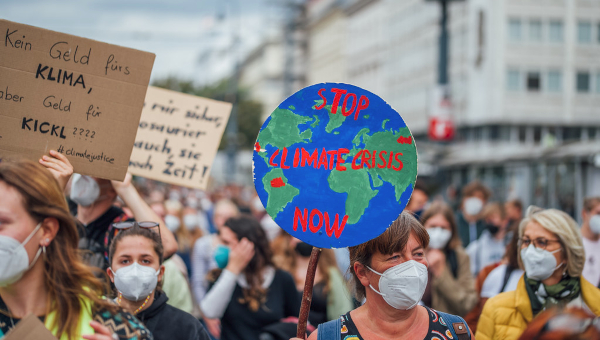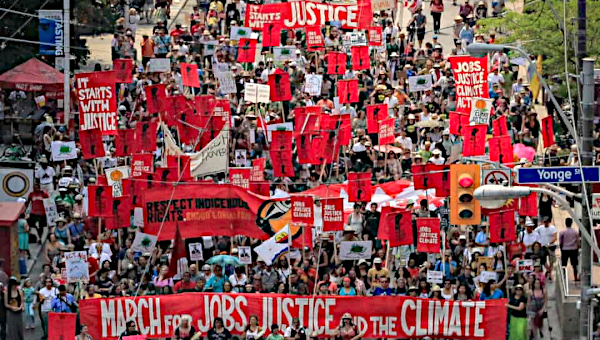The RIO+20 U.N. Conference
An Ecosocialist Assessment
Representatives of governments from all the world will be present at the Rio+20 U.N. Conference on Sustainable Development, June 2012. What can we expect from this so-called “Earth Summit” from a social and ecological perspective? Nothing! Or, to be charitable, very little. This is not only due to the narrow-mindedness, greed, corruption, ignorance and selfishness of most of those governments, and of the multinational enterprises who sponsor the Summit, but to a much more decisive factor: they represent the interests of a social and economic system, modern industrial capitalism, that is fundamentally contradictory with the declared aims of the Conference: to eradicate poverty and protect the environment. The so-called ‘green economy’ – the main proposal of the “Zero Draft,” elaborated by the organizers – is nothing but a greenwashed version of ‘business as usual,’ a ‘green’ fig-leaf hiding the naked ugliness of the existing capitalist market economy, which cannot function without destroying the environment, developing monstrous social inequalities, and moving, with increasing velocity, toward an ecological disaster of unprecedented proportions driven by global warming and the resulting climate chaos.

As ecosocialists we believe that humanity needs radical alternatives, that is, alternatives that deal with the systemic roots of evil, the capitalist paradigm of civilization. We need a new way of life, a new model of civilization, based on values of solidarity and respect for Mother Earth. The only ‘green economy’ is an economy which has suppressed capitalism and the commodification of water, land, air, life, an economy where the means of production and distribution are in the hands of the people themselves, who democratically decide what is to be produced and consumed. An economy based on solar energy – instead of the ecologically disastrous fossil energies – which produces useful, worthwhile outputs and not commodities, and which establishes a radically new relation with our natural environment.
The seeds for a different future are already present in the contemporary struggles, in the indigenous and peasant resistance to capitalist multinationals and agro-business – in the resistance of women in particular, women who are the first victims of ecological disasters – from India to Peru, from South-Africa to Brazil, and from Nigeria to Canada; in the mass demonstrations for Social and Climate Justice, like those in Copenhagen 2009, or Durban 2011, and now in Rio 2012; and in the discussions of the alternative Counter Summits, like the People’s Summit being now organized in Rio. We, as ecosocialists, have much to learn from those struggles and debates, from the multiple experiences and ideas being developed by those who resist and oppose the system, and especially from the ways of life and the harmonious relation to nature evident in many indigenous communities. We all share the belief that ‘another world is possible,’ and that the fight for it begins here and now. •
Ecosocialist International Network www.ecosocialistinternationalnetwork.org.
Hugo Blanco, Leigh Brownhill, Klaus Engert, Ana Isla, Wahu Kaara, Joel Kovel, Michael Löwy, Salvatore Engel Di Mauro (Saed), Pritam Singh, Pedro Ivo Batista, Joâo Alfredo Telles Melo, Terisa Turner, Esther Vivas, Vania Caus, Gabriela Barbosa, Carlinhos, Temistocles Marcelos, Mariana Almeida, Adilson Vieira, Samuel Gonzalez.
Is the ‘Green Economy’
the New Washington Consensus?
I. The ‘Green Economy’: A New Phase of Capitalist Expansion and Structural Adjustment.

- Today we are facing great risks – even a civilization crisis – manifest in many dimensions and exacerbated by unprecedented inequalities. Systems and institutions that sustain life and societies – such as food and energy production, climate, water and biodiversity, even economic and democratic institutions – are under attack or in a state of collapse.
- In the 1980s, faced with a crisis of profitability, capitalism launched a massive offensive against workers and peoples, seeking to increase profits by expanding markets and reducing costs through trade and financial liberalization, flexibilization of labour and privatization of the state sector. This massive ‘structural adjustment’ became known as the Washington Consensus.
- Today, faced with an even more complex and deeper crisis, capitalism is launching a fresh attack that combines the old austerity measures of the Washington Consensus – as we are witnessing in Europe – with an offensive to create new sources of profit and growth through the ‘Green Economy’ agenda. Although capitalism has always been based on the exploitation of labour and nature, this latest phase of capitalist expansion seeks to exploit and profit by putting a price value on the essential life-giving capacities of nature.
- The Rio de Janeiro Earth Summit of 1992 institutionalized important bases for international cooperation on sustainable development, such as polluter pays, common but differentiated responsibilities and the precautionary principle. But Rio also institutionalized the concept of “sustainable development” based on unlimited “growth.” In 1992, the Rio Conventions acknowledged for the first time the rights of Indigenous communities and their central contributions to the preservation of biodiversity. But, in the same documents, the industrialized countries and corporations were guaranteed intellectual property rights to the seeds and genetic resources they stole throughout centuries of colonial domination.
- Twenty years later, in 2012, the plunder continues. The ‘Green Economy’ agenda is an attempt to expand the reach of finance capital and integrate into the market all that remains of nature. It aims to do this by putting a monetary ‘value’ or a ‘price’ on biomass, biodiversity and the functions of the ecosystems – such as storing carbon, pollinating crops, or filtering water – in order to integrate these ‘services’ as tradable units in the financial market.
II. What and Who is Behind the Zero Draft?
- The “zero draft” outcome document for the Rio+20 UN Conference on Sustainable Development is called “The Future We Want.” At the heart of this short text is the section “The green economy in the context of sustainable development and poverty eradication.”
- The zero draft – as with all the vicious attacks of capitalism – is full of generalities to hide the real intentions. The ideological force behind the zero draft is the 2011 UNEP report Towards a Green Economy: Pathways to Sustainable Development and Poverty Eradication that shows clearly the ultimate goal of achieving “green capitalism.”
- At a global scale, the ‘Green Economy’ seeks to disassociate economic growth from environmental deterioration through a three-dimensional capitalism that includes physical capital, human capital, and natural capital (rivers, wetlands, forests, coral reefs, biological diversity and other elements). For the ‘Green Economy,’ the food crisis, the climate crisis and the energy crisis share a common characteristic: the failed allocation of capital. As a result, they try to treat nature as capital – “natural capital.” The ‘Green Economy’ considers it essential to put a price on the free services that plants, animals and ecosystems offer to humanity in the name of “conserving” biodiversity, water purification, pollination of plants, the protection of coral reefs and regulation of the climate. For the ‘Green Economy,’ it is necessary to identify the specific functions of ecosystems and biodiversity and assign them a monetary value, evaluate their current status, set a limit after which they will cease to provide services, and concretize in economic terms the cost of their conservation in order to develop a market for each particular environmental service. For the ‘Green Economy,’ the instruments of the market are powerful tools for managing the “economic invisibility of nature.”
- The main targets of the ‘Green Economy’ are the developing countries, where there is the richest biodiversity. The zero draft even acknowledges that a new round of “structural adjustments” will be necessary: “developing countries are facing great challenges in eradicating poverty and sustaining growth, and a transition to a green economy will require structural adjustments which may involve additional costs to their economies…”
- But the ‘Green Economy’ is not a fiction of the future: it is already here. As the zero draft states, “We support policy frameworks and market instruments that effectively slow, halt and reverse deforestation and forest degradation.” This is referring to REDD (Reducing Emissions through Deforestation and Forest Degradation), an initiative of the UNFCCC which consists of isolating and measuring the capacity of forests to capture and store carbon dioxide in order to issue certificates for greenhouse gas emission reductions that can be commercialized and acquired by companies in developed countries that cannot meet their emission reduction commitments. We have already seen that the market for carbon credits based on forests will lead to: a) noncompliance with effective emission reduction commitments by developed countries; b) the bulk of resources being appropriated by intermediaries and financial entities and rarely benefitting countries, Indigenous peoples and forests themselves; c) the generation of speculative bubbles based on the sale and purchase of said certificates; and d) the establishment of new property rights over the capacity of forests to capture carbon dioxide, which will clash with the sovereign rights of States and the Indigenous peoples that live in forests.
- The postulates promoted under the ‘Green Economy’ are wrong. The current environmental and climate crisis is not a simple market failure. The solution is not to put a price on nature. Nature is not a form of capital. It is wrong to say that we only value that which has a price, an owner, and brings profits. The market mechanisms that permit exchange among human beings and nations have proven incapable of contributing to an equitable distribution of wealth. The main challenge for the eradication of poverty is not to grow forever, but to achieve an equitable distribution of the wealth that is possible under the limits of the Earth system. In a world in which 1% of the population controls 50% of the wealth of the planet, it will not be possible to eradicate poverty or restore harmony with nature.
- The ‘Green Economy’ agenda is a cynical and opportunistic manipulation of the ecological and social crises. Rather than addressing the real structural causes of inequality and injustices, capital is using ‘green’ language to launch an aggressive new round of expansion. Corporations and the financial sector need governments to institutionalize the new rules of the ‘Green Economy’ to guarantee them against risks and to create the institutional framework for the financialization of nature. Many governments are willing partners in this project as they believe it will stimulate a new phase of growth and accumulation.
- Indeed, this ‘Green Economy’ is the new Washington Consensus which is to be launched at Rio+20 (June 20-22, 2012) as the next stage of capitalism to recover lost growth and profits. This is definitely not the future that WE want. •
Christophe maintains a blog at www.nogreeneconomy.org where this article first appeared.
Values Versus Prices
At the Rio+20 Earth Summit
Patrick Bond
Given the worsening world economic crisis, the turn to ‘Green Economy’ rhetoric looms as a potential saviour for footloose financial capital, and is also enormously welcome to those corporations panicking at market chaos in the topsy-turvy fossil-fuel, water, infrastructure construction, technology and agriculture sectors. On the other hand, for everyone else, the Rio+20 Earth Summit underway this week in Brazil, devoted to advancing Green Economy policies and projects, appears as an overall disaster zone for the people and planet.
Meanwhile in Mexico, the G20 meeting of the real powerbrokers this week included a Green Economy session. But more serious distractions for the elites include ongoing Southern European revulsion at harmful public policies cooked up by bankers, and potential war in the Middle East. Perhaps a few environmentally-decent projects may get needed subsidies as a result of the G20 and Rio talkshops, and we’ll hear of ‘Sustainable Development Goals’ to replace the fatuous UN Millennium Development Goals in 2015.
But the overarching danger is renewed official faith in market mechanisms. No surprise, following the logic of two South African precedents: the 2002 World Summit on Sustainable Development in Johannesburg (Rio+10) and last December’s Durban COP17 climate summit. There, the chance to begin urgent environmental planning to reverse ecosystem destruction was lost, sabotaged by big- and medium-governments’ negotiators acting on behalf of their countries’ polluting and privatizing corporations.
Market Fixes to Market Failures?
It’s useful to interrogate the eco-governance elites’ assumptions. I’m here in Rio at the International Society for Ecological Economics conference (ISEE) within a critical research network – the Barcelona-based Environmental Justice Organizations, Liabilities and Trade (EJOLT) – whose leaders, Joan Martinez-Alier and Joachim Spangenberg, issued a statement appropriately cynical about the Green Economy: “The promises are striking: conserving nature, overcoming poverty, providing equity and creating jobs. But the means and philosophy behind it look all too familiar.”

Unfortunately, after the original 1992 Rio Earth Summit, multinational corporations increasingly dominated the emerging terrain of global environmental governance. The United Nations Environment Programme came to view “the sustainability crisis as the biggest-ever ‘market failure’” – a dangerous distraction, according to the two political-ecologists, because “Describing it this way reveals a specific kind of thinking: a market failure means that the market failed to deliver what in principle it could have delivered, and once the bug is fixed the market will solve the problem.”
Martinez-Alier and Spangenberg reverse this logic: “Unsustainable development is not a market failure to be fixed but a market system failure: expecting results from the market that it cannot deliver, like long-term thinking, environmental consciousness and social responsibility.”
In the same spirit, Sunita Narain of the Centre for Science and Environment in Delhi chastised ISEE’s conventional economists in a plenary: “There are a million struggles in India against pollution that Martinez-Alier calls the ‘environmentalism of the poor,’ in contrast to the Green Economy which is the environmentalism of the rich.”
Narain continued,
“The issue is not the price of nature, it’s rights and it’s the values of democracy, of governance, of society, of humanity. Let’s be very clear: in today’s Green Economy as it is being shaped in Rio Centro and by many economists, these principles will not help us move ahead. Let’s not get lost in yet another shallow, empty concept.”
It’s critical to pose the Green Economy from this class-analytic and eco-centric standpoint, especially because inside the official Rio Centro, negotiations on a bland pro-market text continue through Saturday. There, progressive civil society strategies to insulate basic human and natural rights – e.g. to water – are being foiled by negotiators and by the host neoliberal Brazilian government which is channelling reactionary positions from Northern negotiators, especially from Washington, Ottawa, Tokyo and Tel Aviv, the main saboteur-regimes when it comes to water justice.
According to Anil Naidoo of the Ottawa-based Blue Planet Project, “the new negotiating text is out and it is terrible! We expected the attacks to continue as we have made strong gains through our pressure, but clearly we must again fight for our human right to water and sanitation.” In spite of excellent anti-privatization activism by Naidoo’s allies in dozens of cities across the world, water commercialization remains a major threat, especially thanks to the World Resources Institute’s mapping of scarcity on behalf of thirsty transnational corporations.
Also within the rubric of the Green Economy, corporations are seeking new technological ‘False Solutions’ to the climate and other environmental crises, including dirty forms of ‘clean energy’ (nuclear, so-called ‘clean coal,’ fracking ‘natural gas,’ hydropower, hydrogen, biofuels, biomass and biochar); dangerous Carbon Capture and Storage experiments; and other whacky geoengineering gimmicks such as Genetically Modified trees to sequester carbon, sulfates in the air to shut out the sun, iron filings in the sea to create algae blooms, and large-scale solar reflection such as industrial-scale plastic-wrap for deserts.
From African ‘natural capital’ to Pricing to Markets
Crazy corporate tactics aside, the philosophical underpinning of the Green Economy needs wider questioning. The precise wording is terribly important, as Africans began to understand after last month’s ‘Gaborone Declaration’ hosted by Botswana president Ian Khama. He brought together leaders from nine other African countries – Gabon, Ghana, Kenya, Liberia, Mozambique, Namibia, Rwanda, South Africa and Tanzania – to “quantify and integrate into development and business practice” what ordinary people consider to be the innate value of nature.
But these leaders and their conference sponsor Conservation International mean something else, devoid of eco-systemic, spiritual, aesthetic, and intrinsic qualities. The Declaration insists, “Watersheds, forests, fisheries, coral reefs, soils, and all natural resources, ecosystems and biodiversity constitute our vital natural capital and are central to long-term human well-being, and therefore must be protected from overuse and degradation and, where necessary, must be restored and enhanced.”
There are good sentiments as far as they go, yet by relegating our environment to mere natural capital, the next step is to convert value into price and then sell chunks of nature on the market. All manner of financialization strategies have emerged to securitize ‘environmental services,’ most obviously in carbon markets which continue failing miserably to deliver investor funds to slow climate change.
For some institutions we can term yuppie-green due to their pro-market ideology, faith continues in spite of emissions trading’s descent to hell. In a joint paper published last week, the World Wide Fund for Nature (WWF) and Greenpeace advocated last-gasp reforms to revitalize the European Union carbon markets. Like the Chicago exchange in 2010, the EU Emissions Trading Scheme is in real danger of dying, what with last month’s drop-out announcement from Munich’s leading financiers, who cited a fatal degree of corruption and market oversupply.
The 2010 crash of the Chicago Climate Exchange – and an ongoing civil fraud lawsuit against founder Richard Sandor – is only the most obvious warning to those promoting emissions trading and voluntary offsets. In Africa, we argue based on new research for EJOLT, the ‘Clean Development Mechanism’ (CDM) carbon-trade and offset mechanism ‘Cannot Deliver the Money.’
The Durban COP17 climate gamble – that carbon markets could be revived as part of a renewed Kyoto Protocol mandate – was lost by virtue of the negotiators’ failure to make post-2012 emissions-cut commitments. And the Bonn follow-up meetings of the UN Framework Convention on Climate Change last month just amplified the crisis, by all accounts.
But the crisis facing the market crew aiming to ‘privatize the air’ is also pushing environmentally-oriented bankers in all sorts of other directions. Explained City of London investor Simon Greenspan, whose firm won World Finance magazine’s ‘Western European Commodities Broker of the Year’ award four months ago, “At Tullett Brown we’ve only ever invested in areas of the market that have truly stood the test of time, such as gold and silver and property. When our analysts were looking for the next great area of growth it was fairly obvious to them. It was the planet, it was the environment.” (Oops, just days later, British financial authorities forced Tullett Brown into provisional liquidation.)
Reacting to the Gaborone Declaration, Nnimmo Bassey from the Niger Delta NGO Environmental Rights Action and Friends of the Earth International warned, “The bait of revenue from natural capital is simply a cover for continued rape of African natural resources.” Thanks to inadequate protection against market abuse, he adds, “The declaration will help corporate interests in Rio while impoverishing already disadvantaged populations, exacerbate land grabs and displace the poor from their territories.”
To illustrate the pernicious way markets undermine nature, Zimbabwe’s president Robert Mugabe would say of the rhino and elephant 15 years ago, “The species must pay to stay” – which in turn allowed him and (white) cronies to offer rich overseas hunters the opportunity to shoot big game for big bucks. The dilemma about hunt marketing is that it doesn’t stop there: black markets in rhino horns and elephant tusks are the incentive for poachers to invade not just poorly defended game parks north of the Limpopo River, but also now in South Africa.
The alternative strategy would have been to tighten the Convention on International Trade in Endangered Species’ restrictions against trade in ivory. But South Africa’s game-farm owners and free-market proponents got too greedy, and by influencing Pretoria to press for relaxation of CITES’ ban, hundreds of elephant and rhino corpses denuded of horns and tusks now litter the bush.
From Prices to Values, and From Fees to Fines
At best, the Gaborone Declaration commits the ten countries to “reducing poverty by transitioning agriculture, extractive industries, fisheries and other natural capital uses to practices that promote sustainable employment, food security, sustainable energy and the protection of natural capital through protected areas and other mechanisms.”
How, though, is the crucial question. It is well and good to protect nature through imposing a prohibitive fine and ban on those who pollute, and it is past time for payment of the ‘climate debt’ from the Global North’s companies and government which take too much of the shrinking carbon space left in the environment, for instance.
As Kathy McAfee from San Francisco State University puts it, “Compensating the poor and other land users for practices that maintain healthy, ‘service-producing’ ecosystems may be an important part of strategies for sustainable and equitable development. Serious problems arise, however, when such compensation schemes are framed as markets.”
It is another matter, entirely, to treat nature as ‘capital’ from which a fee-for-use – at Rio+20, termed ‘payment for environmental services’ – is offered by deep-pocket polluters to continue business-as-usual.
What do we need in coming years? Valuing nature and imposing pollution-bans and prohibitive fines for ecological degradation are the conceptual approach and the strategy required. But given the power balance here, we can instead expect the Earth Summit to promote the pricing of nature based on a pollution-fee system and environmental markets, which in effect will give discredited bankers the job of regulating world ecology.
Then watch out, people and planet – you will be swamped by hunger for profits. •





